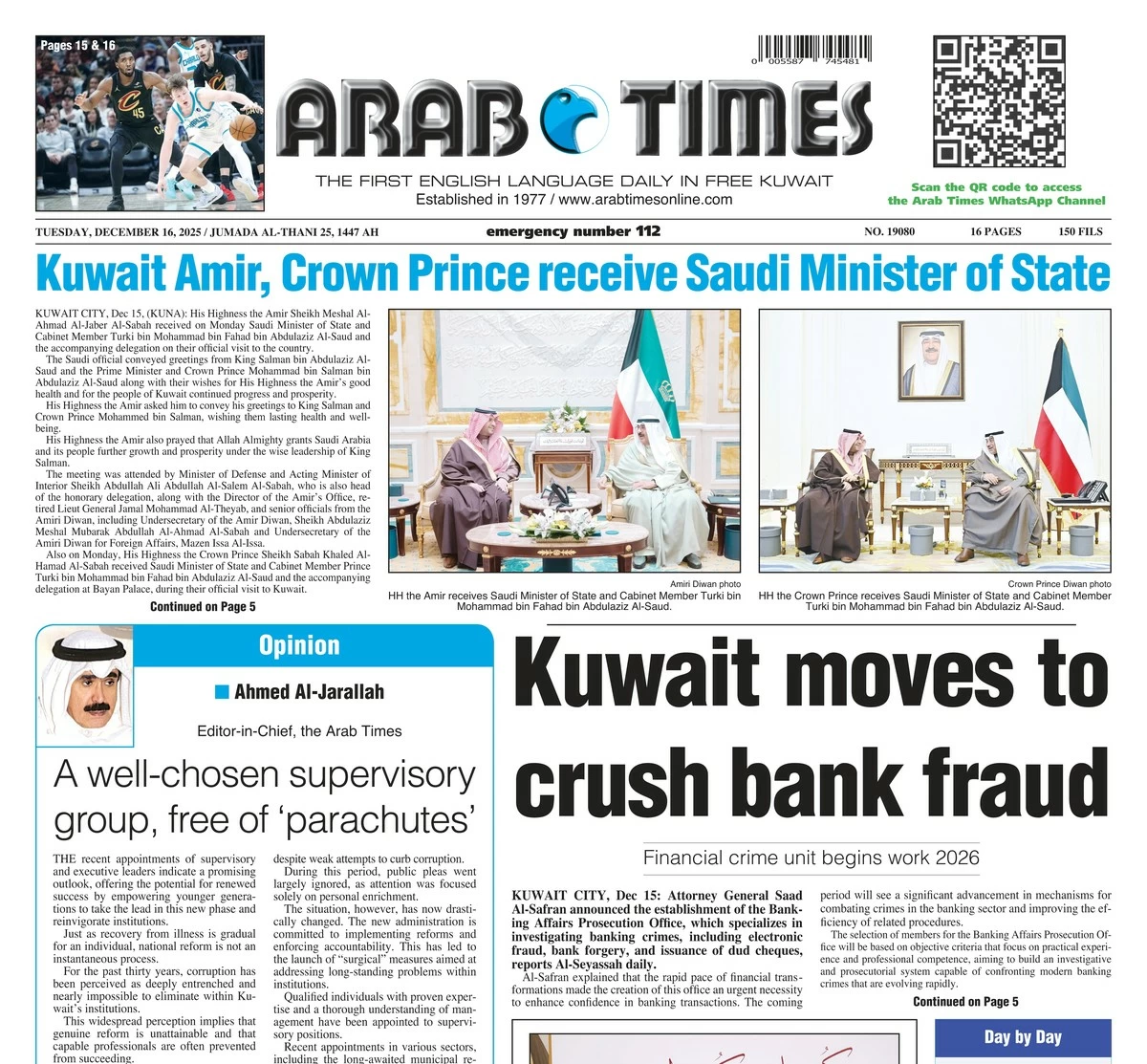21/03/2024
21/03/2024
KUWAIT CITY, March 21: The Court of Appeals has set a session on Sunday to rule on the disqualification cases of 2024 parliamentary election candidates Marzouq Al-Habini, Marzouq Al-Khalifa, Ahmed Mutee and Jaber Al-Muhailbi. Earlier, the Administrative Court canceled the decision to disqualify Marzouq Al-Khalifa and Ahmed Mutee; thereby, putting their names back to the list of candidates for the upcoming parliamentary election.
The court rejected the appeal of Fifth Constituency candidates Jaber Al-Muhailbi and Marzouq Al-Habini against the decision to remove them from the list of candidates. The court received electoral appeals from some candidates disqualified by the Ministry of Interior, demanding in their appeals to cancel the decision to disqualify them and re-register their candidacy in the electoral district in which they were registered.
This came after the ministry decided to disqualify some candidates for failing to fulfill one of the electoral conditions due to their conviction for the crime of participating in by-elections. The ministry informed Ahmed Mutee, Jaber Al-Muhailbi, Marzouq Al-Habini, Marzouq Al-Khalifa, Sheikh Mishal Al- Malik, Mohammad Al-Juwaihil, Walid Al-Nasser, Mohammad Al-Azmi, Hani Hussein, Adel Al-Saeedi and Mubarak Trad about their disqualification; in addition to three other candidates who failed to complete the registration procedures.
Meanwhile, Fourth Constituency candidate Musaed Al-Qeraifa said the Constitution must be amended; because the State should not be managed according to the mentalities of the people in the 1960s, “considering we are in 2024.” In a podcast interview, Al-Qeraifa stressed that Kuwait is no longer a testing field for members of the Sabah Family to be appointed as prime ministers.
It is worth mentioning that Al-Qeraifa was disqualified in the previous election as per the law on prohibiting those convicted of offending the Amiri entity. He is also among the beneficiaries of the recent amendment of the law, which reduced the rehabilitation period for those convicted of such a crime. Former MP and Fourth Constituency candidate Fayez Al-Jomhour disclosed that if he wins in the election, his cooperation with the government will be based on how the latter deals with urgent public issues; the most important of which are the bills on improving the standard of living of citizens. He asked HH the Prime Minister Sheikh Dr Mohammad Sabah Al-Salem Al-Sabah to be careful in choosing ministers. He then voiced objection to the reappointment of Deputy Prime Minister, Minister of Defense and acting Minister of Interior Sheikh Fahad Yusuf Al-Sabah.
Meanwhile, the Consultation Chamber at the Constitutional Court has rejected the appeal to cancel the upcoming parliamentary election and invalidate the Election Invitation Decree due to the absence of a state of necessity and the unconstitutionality of restricting the exercise of the right to vote. The appellant, Attorney Saad Al-Lamie, argued that there is no state of necessity and that the text restricting the exercise of the right to vote is unconstitutional as per the Islamic law. The court explained in the merits of its decision that the appellant did not provide any evidence of the actual harm caused to him as a result of the application of the contested decree, such that ruling on its unconstitutionality would remove this harm and achieve a benefit for him. It emphasized the need to show the extent to which the implementation of this decree reflects on his position and status; so the direct personal interest can be investigated in light of that, but there is no evidence in this regard.
The appellant asserted that the opinion on constitutional jurisprudence and the previous ruling of the Constitutional Court state that it is not permissible for the government to dissolve the National Assembly and then issue a decree of necessity to change the electoral map, because this is considered invalid for the electoral process. The appellant pointed out in his direct appeal that Decree Law No. 4/2024 on the election of Assembly members is unconstitutional due to the absence of a state of necessity, which is required as per Article 71 of the Constitution. The call for fresh elections is undoubtedly a necessary decree according to the constitutional concept and the decree may not amend the Election Law; but going further, the decree may only amend laws that are approved by an ordinary majority and it should not affect the scope reserved for the legislator.
By Saeed Mahmoud Saleh and Jaber Al-Hamoud
Al-Seyassah/Arab Times Staff


